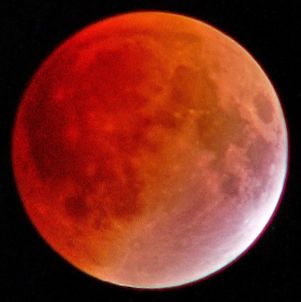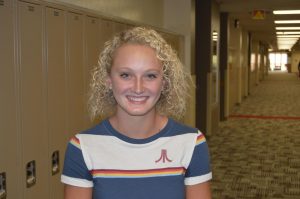Total lunar eclipse visible overnight

Photo used with permission of Wikimedia Commons.
The upcoming eclipse will be the 18th one this century. In the twenty-first century, 85 lunar eclipses will appear.
On Sunday night and into Monday morning, Jan. 20 to 21, the super blood wolf moon total lunar eclipse will occur. Lunar eclipses happen during a full moon when the moon passes through the Earth’s shadow, giving the moon a rusty orange or dark red color.
This eclipse is referred to as a super moon because the moon will be in close proximity to the earth at this time, making it appear larger. The wolf portion of the name comes from the term for a full moon in January. Traditionally, the term was used by Native Americans when wolves would howl in hunger outside their villages.
The lunar eclipse will be visible across all of North and South America and slightly visible in Africa and Europe. This will be the first total lunar eclipse wholly visible across the U.S. since Dec. 21, 2010.
The first phase of the eclipse, also called the penumbral phase, starts at 9:36 p.m. The total eclipse begins a couple hours later at 11:41 p.m. The max eclipse does not start until 12:12 a.m. and ends at 12:43 a.m. The whole lunar eclipse ends at 2:48 a.m.
Unlike last year’s solar eclipse, a lunar eclipse apparent for much longer and safe to look at. It takes the moon much longer to travel through the Earth’s much larger shadow for a lunar eclipse than when the the moon travels through the slim vision of the sun during a solar eclipse.
“The lunar eclipse the moon is being covered up, and you can always look at the moon because the moon is just reflecting sunlight and there is no light being admitted from the moon,” Astronomy teacher Marcy Clone said.
Clone has been teaching her students about the lunar eclipse as it approaches. She encourages them to try to watch even though the weather on Sunday night will be around -10 degrees.
“See if you can find a spot in your house where you can see the moon if the clouds aren’t there,” Clone said. “Otherwise just watch it online on nasa.com or space.com. Those are great places, and they’ll have live feeds.”
Senior Megan Pinson is a former student of Clone’s and loves learning about astronomy. She plans on watching the lunar eclipse on Sunday night and even braving the cold.
“I’ll probably go somewhere with my friends with some open space so I can see it better, or worst case I’ll watch it from my backyard,” Pinson said.

Grace Mossing is a senior and Editor-in-Chief of N the Red. She loves traveling, being outdoors, diving, and hanging out with friends, and she is very...


![All of the choirs wait behind stage before the curtains are pulled up to signify that they will start their second performance of Winter Spectacular on Saturday, Dec. 3. Some share words of encouragement to deteriorate any fears their peers may have. “My biggest motivation is [knowing] that my friends are right here with me and they're going through the same thing,” freshman Abby Lawton said. “When you join choir, you're in a family and they motivate me. They're truly inspiring and they motivate me to work harder and actually do the things I love.”](https://fisherstigertimes.com/wp-content/uploads/2022/12/15-300x200.jpg)

